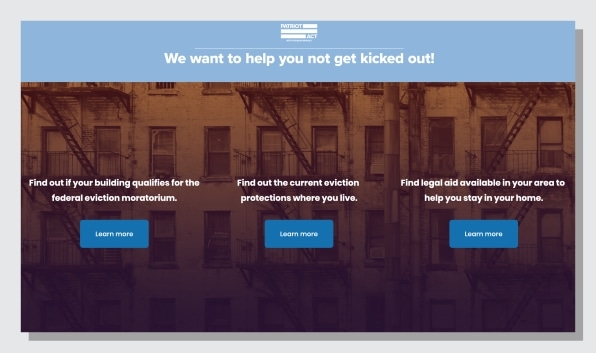Hasan Minhaj’s ‘Patriot Act’ wants to help you figure out what to do if you can’t pay rent
Rent is almost due again, but for many of the millions of Americans out of work during the COVID-19 pandemic, their financial situation hasn’t changed. Nearly 20% of renters across the country did not pay their May rent in the first week of the month, and nearly 10% still didn’t by May 20. Rent moratoriums and eviction protections are complicated and can vary from state to state. If you’re having trouble paying rent and aren’t sure what measures are in place to help you during this pandemic, you can now go to dontgetkickedout.com, a website of renter resources put together by the Netflix show Patriot Act with Hasan Minhaj.
What happens if you can’t pay rent? A recent episode of Patriot Act focused on exactly this question, outlining the eviction process, the history of predatory landlords before the coronavirus crisis, and the trickle-down effect of delayed or skipped rent payments—like how without rent, property taxes that go to firefighters, teachers, and utilities may not be paid, and how if your landlord loses their property, it could get bought up by big corporations with a history of high evictions. “Eviction is the crisis coming after the crisis,” Minhaj says in the episode. “Without massive federal intervention, millions of Americans are going to be evicted who don’t deserve it.”

The CARES Act does halt evictions nationwide for four months, but only for renters in buildings subsidized by the federal government, or with federally backed mortgages. If you’re not one of those renters, you have to figure out your local laws. “You’re also probably wondering, “‘How am I supposed to know what kind of mortgage my landlord has?’” Minhaj says. “Dude, I don’t even know my landlord’s last name. . . . Now you want me to find out who my landlord banks with?”
Renters also probably don’t know the ins and outs of housing court, which is why so many lose to their landlords when fighting evictions. In most places in the U.S., you don’t have the right to a lawyer in housing court (unlike in criminal court). New York was the first city to pass a “right to counsel” law in 2017, providing legal representation to tenants facing eviction who have incomes below 200 percent of the federal poverty level. In the first year of that law, evictions dropped 11% in zip codes with a right to counsel, compared to just 2% in zip codes without. For the millions of Americans without a right to counsel in housing court, obtaining a lawyer is another complicated hurdle to overcome.
Those three questions are what the Patriot Act website hopes to answer for renters across the country. At dontgetkickedout.com, you can figure out if your building qualifies for that federal eviction moratorium, you can see how your state specifically is protecting tenants from eviction (via the COVID-19 Housing Policy Scorecard—more on that here), and if you do still have to go to housing court during this pandemic, there’s a resource to help you find a lawyer.
(13)



